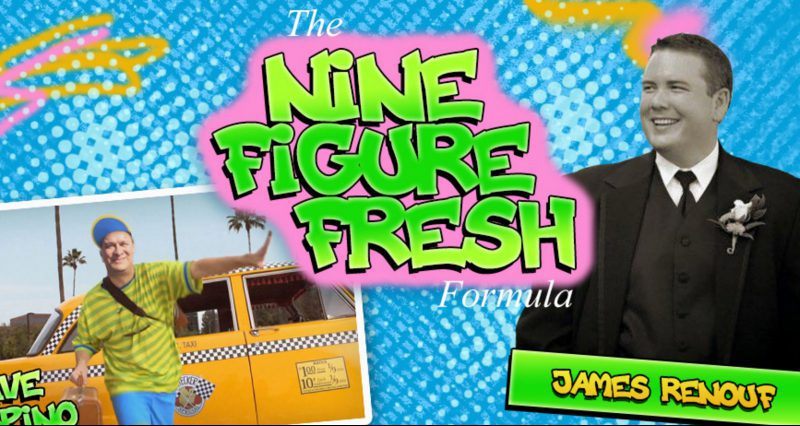This whole website is dedicated to reviewing products that claim they help online entrepreneurs build a better business.
That is all great and I am so glad to be alive during a time where information and products to help us succeed are so abundant that it’s become a no-brainer to start an online business for yourself.
However, as with all things, not everything that shines is gold.
Since I’ve started this website (and in the past as well), I’ve been spending more and more time looking at such programs in more depth.
Now that I have a solid experience of making money online, you can say that I’m a bit more experienced, thus, I know what works and what doesn’t, but newbies trying desperately to find “something” that promises easy success, do not have this luxury.
But, newbies trying desperately to find “something” that promises easy success, do not have this luxury.
I remember myself 5 odd years ago opening up my emails and seeing a different product sent to me by my “guru” damn near every day promising me this system is what officially works.
Needless to say, only a very, very few percentages of those claims were true.
In this post today, I want to teach you how to spot an online scam.
The reason being is that it is my goal to help people start their own online business BUT if people are buying up scam products that do not deliver what they promise, it will leave a bad taste in the mouth of people that are looking to learn more.
I also find it a bit frustrating to know that people are falling for such scams, thus losing their money and hindering their learning process.
If you’ve been caught up in a scam product or even if this is your first-time finding out that yes, online scams actually do exist then listen up, this post should help you identify a scam before you reach for your credit card and type your number in.

What Is An Online Scam Anyway?
Before I get into the post here, I would like to clarify exactly what I mean by “online scam”.
Does that mean they will take away your money and drain your bank accounts and leave you homeless? Some products may but they are very rare to come across so don’t worry.
The way I define a “scam” is this….
Too much money for little value:
Sometimes you come across a product that is retailing for $37 but once you buy it, you find that it’s just a short ebook explained one simple thing of the whole wide spectrum of online business.
Other times you will find that the product is just a 5 video series created on a WordPress blog that you can access if you know the link to it without paying.
While sure, there is a value being exchanged here; you get information and they get paid (fair enough), it’s often times overpriced.
How are you going to charge me $37 for a 10-page ebook or $97 for 10 five minutes video?
To add insult to injury, most often the information is pulled directly from other free places online and packaged in a way to sell it. You can easily find the same information if you just spend some time researching and reading online.
Over-hyped claims:
This idea of becoming an overnight success is just plain false, as I will explain further down in this post.
Focused on extortion money rather than make you money:
Online scams usually come with a lot of upsells. This means that they advertise a product for a low cost, then once you buy the product, you will find out that you need to buy more features for the “magic system” to work.
Usually these are offered in “upsells” and what was once a $9 eBook, can turn into a $500+ package in order for you to get everything you need.
But obviously, they do not say that in the beginning.
Now that we know what an online scam is, let’s take a look at how you can spot one and save you some money.

#1: What Is The Selling Point Here?
At first glance, such products come with an awe-inspiring sales page that probably had more effort put in it that the actual product itself.
It’s so easy to get “sucked” into a sales page where an auto-played video comes up telling you how to fix all of your problems.
I know, I’ve been there in the past and even to this day, sometimes I find myself getting very intrigued with the quality of the sales page.
That’s all great, and kudos to them for their amazing marketing, but take a closer look and see what they are saying exactly on their sales page.
Is it something similar to the following?
- “Use this system to make $400 commission every day”
- “A simple hack to trick Google”
- “One simple method to open up a hidden source of traffic”
- “This student made $13,000 last month using this guide”
That is all great but if you look at it closely enough, you will realize that they do not talk about the actual product itself. They want you to buy into the dream before you buy into the product.
That’s a highly regarded rule of marketing, but the product has to be of value right?
I can easily sell you a dream of living on the beach writing blog posts (which is ludicrous by the way) but if the product I sell you is garbage, then you’re not getting anywhere close to the beach soon.
That is why out of all the products I reviewed, the two main ones I like are Fizzle and Wealthy Affiliate.
Straight from the get-go, it is made clear that hard work is involved and the process of building a real online business takes time.
If you ever come across a product that is promising you instant success and there is no mention of the work you will be doing, then it’s probably a scam.
I’ve tried many ways to make money online and trust me, the ones that worked never were easy.
#2: Who Is The Person Behind The Product?
Now we’ll be getting more technical but this is a major, major part of learning how to spot an online scam.
One thing that clearly points to a product being a scam (or at least not as good as they it is) is by looking at who has created the product.
Most of the products I have reviewed so far all have the same group of people involved with them or at least have the same people affiliated in some way with the product.
The reason this is important is because people that create such products usually create multiple products every week or so.
The way that they earn money is this way:
- They create a sub-par product,
- Flood the market with it,
- Make their money,
- The products fade away (cause it’s garbage),
- Create another product and repeat the cycle.
Now am I saying that every product is bad? No.
But you have to look at who created it and if they have a long history of promoting multiple products that have turned out to be a scam as well.
See products that are actually “good” are not products that only last for a week. My main training platform, which I’ve also been a member now for 4 years, has been around for 10 years and it is constantly evolving.
That is how you know if a product is good; It stands the test of time while constantly being updated and promoted.
#3: Over Hyped Money Claims? Probably A Scam
If you’re ever seeing a product page and you come across over-hyped money claims, you naturally get a gut feeling that says, “Is this legit?”. If not take a look at the image above, taken from one of my recent reviews.
I say trust your gut feelings because it’s most probably right (more on this later).
See what I like about the human body is that the mind can be tricked, but the emotions we feel and that “gut feeling” cannot be manipulated.
If you’ve found a product that promises you to be rich in a few days simply by following a “hack” or by “dipping into a hidden traffic source”, then you are definitely looking at a scam.
The internet is great, and you can find a lot of great information about anything you want but so far, in my 5 years experience online, I have never come across a product that sells for $9.97 and can make you rich by tomorrow.
There is just no way that can be done.
If it sounds like it’s too good to be true, (well you know how that goes); It probably is.
Do not trust people that tell you making money online is “effortless”. I work 14 hours a day on my business and the focus of my work is based on reviewing such products.I have not yet found one that can deliver “easy riches”.
I have not yet found one that can deliver “easy riches”. If there ever was one like that, I am sure I would’ve found it by now.
#4: Your Gut Feeling
As I’ve talked about in my previous point, I am a true believer in the idea of our gut feeling having a high percentage rate of being right.
If you are looking at a sales page and you think something is not quite right, then I suggest you really do your due diligence before you buy.
By that I mean do your research and look for reviews online.
But beware when you are researching your reviews, always look at the intention of the person writing the review.
Most of the top 10 search results will be blog posts that positively review a product (even if it’s garbage) just for them to make a sale.
Do not read just one review, take your time to read through at least a few reviews from different sources and see if what they are saying matches up.
Alternatively, you can also email me and tell me which product you would like reviewed and I will purchase it, try it and do my honest review for it and email you back with my findings.
How To Tell If A Product Is “Legit”

Now that we’ve talked about how to spot an online scam, I would also like to run by you what non-scammy products look like.
Not every good product will be able to check off all of these “rules” but if it gets a pass mark, most probably it is legit.
(Again, you can always email me to ask me to review it.)
Here is what a typical non-scammy product would look like:
No indication of it being a get-rich-quick scheme:
My two main products that I promote Fizzle and Wealthy Affiliate all have one thing in common and that is: focus on hard work.
As you can see from my reviews of both of them (Fizzle and WA) that is something I really like to see in a product.
I now know that easy riches cannot be made online so it’s really refreshing to see 2 products that promote the idea of working hard.
They offer a free trial:
This will not be the case with every product I consider being “worth the money” but it sure is helpful when it comes to picking out something to follow.
Again; Fizzle and WA are both free to try but not just them, even the products I love to use and I can say helped my business all have free trials.
Take a look at:
- Canva (Graphic Design) – free
- CoSchedule’s Headline Analyzer (Writing tool) – free
- Buffer (social media app) – free
- Aweber (email marketing software) – $1 for your first month.
- MailChimp (email marketign software) -free
- SiteRubix (website builder) – free.
I don’t know if it’s right that we’ve come to expect the freemium model but it sure is a good thing to have.
Why would you want to invest hundreds of your money into a system that you have no idea what it does, how it works and what it can do for you?
That is the case with 98% of the products I review here.
Is that me being cheap? Maybe. But I do like to try something before I fully commit to it.
Obviously, these products are not entirely free, but it’s really a good thing to see what you will be buying into.
It’s been around for a while:
As I’ve said earlier, most of these scam products do not last more than just a couple of weeks (until the marketing budget runs dry) but good products and websites last for years.
WA and Fizzle both have been around for years and they have proven that their system works since they have a plethora of students showing proof of their success.
Closing Words
I really hope this post has shown you the entire process of how to spot an online scam. The reason I’ve started this project was to protect the people that are looking to start an online business.
The process is already difficult enough but I hate to think of people being scammed out of their money to fill up somebody’s else’s pockets by supplying wrong, outdated and just plain garbage information.
If you do have any questions, be sure to leave them down below as I would like to hear your thoughts.
Thank you for reading, till next time.